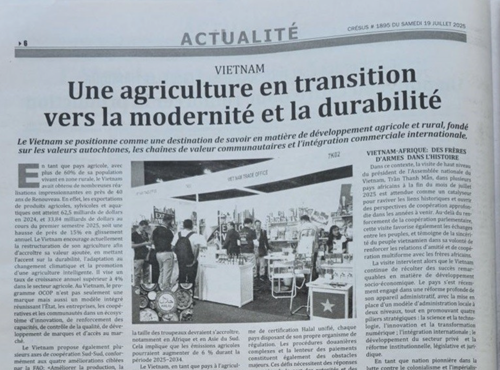The article described Vietnam as an emerging “knowledge destination” in agricultural and rural development, citing its approach grounded in indigenous values, community-based value chains, and international trade integration. With more than 60% of its population residing in rural areas, Vietnam has made remarkable progress over nearly four decades of economic reform. In 2024, the country’s agro-forestry-fisheries exports reached 62.5 billion USD; in the first half of 2025 alone, the figure stood at 33.84 billion USD, representing a year-on-year increase of around 15%.
    |
 |
|
The article on Algerian daily Crésus |
Vietnam is now accelerating its agricultural restructuring towards higher value, sustainability, climate resilience, and high-tech application, with the goal of sustaining annual growth rates above 4%.
The article gave special attention to the “One Commune, One Product” (OCOP) program, describing it not only as a national brand but also as an integrated development model that brings together the State, businesses, cooperatives, and communities. OCOP, it noted, has fostered a rural innovation ecosystem, enhancing production capacity, quality control, branding, and market access.
Crésus praised Vietnam’s leadership in promoting South–South cooperation, particularly under the four pillars outlined by the UN Food and Agriculture Organization (FAO), including better production, better nutrition, a better environment, and better lives, ensuring no one is left behind. The article highlighted Vietnam’s active role in building networks for policy, technology, and market sharing, while supporting vulnerable groups and strengthening rural cooperatives and small enterprises.
The paper echoed Vietnam’s call to international organizations, financial institutions, and bilateral and multilateral partners to enhance support for South–South cooperation, especially in scaling up OCOP, towards a dynamic, inclusive, culturally rich, and sustainable agriculture.
Vietnam, the article noted, with its strong agricultural foundation and experience in low-carbon development, is well placed to partner with African nations in tackling food security and promoting green, sustainable agriculture.
The potential for Vietnam’s Halal-certified products also drew attention, particularly those already present in demanding markets such as the UAE, Malaysia, and Indonesia. The article expressed optimism that tropical Halal goods from Vietnam would increasingly gain ground in African markets as existing barriers are gradually eased.
A notable development highlighted in the article was the recent inauguration of the first direct air link between Vietnam and Africa. Ethiopian Airlines Flight ET0678 from Addis Ababa landed safely at Hanoi’s Noi Bai International Airport on July 11, marking the first direct connection between the two capitals. The new route is expected to provide fresh impetus for trade, tourism, and cultural exchange between the regions.
Crésus believed that building on a solid foundation of traditional friendship, Vietnam and African countries will continue to deepen their relations through practical and effective cooperation in this new era.
The top Vietnamese legislator’s official visits to Senegal and Morocco are expected to strengthen parliamentary diplomacy, and promote people-to-people exchanges, demonstrating Vietnam’s genuine commitment to its African partners.
The visit comes as Vietnam records continued socio-economic progress. Alongside ongoing reforms in public administration and the rollout of a two-tier local government model, Vietnam is advancing four strategic pillars: science and technology, innovation and digital transformation; deeper international integration; private sector development; and comprehensive institutional, legislative, and law enforcement reform, laying a firm foundation for sustainable growth and global engagement.
The article lauded Vietnam’s determination to combating bureaucracy, corruption, and wastefulness, recognized as common barriers to development of every nation, and its willingness to share valuable experiences in poverty reduction, investment mobilization, and nation-building.
It concluded by underscoring the need to deepen political trust and enhance high-level exchanges, while fast-tracking negotiations on key legal frameworks such as investment protection and double taxation avoidance agreements.
Source: VNA